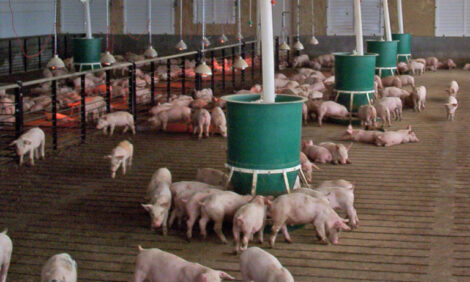



New research: transmissibility of African Swine Fever Virus in semen
Can ASFV be spread through boar semen to gilts and her piglets?The rapid spread of the African swine fever virus (ASFV), causing severe disease with often high fatality rates in pigs, prevails as a threat for pig populations and dependent industries worldwide. Although advancing scientific progress continually enhances the industry's understanding of ASFV pathogenesis, alternative transmission routes for ASFV have yet to be assessed. A recent study demonstrated that ASFV can efficiently be transferred from infected boars to naïve recipient gilts through artificial insemination (AI).
In modern pig production, semen from boar studs often supplies many sow herds. Thus, the infection of a boar stud presents the risk of rapidly and widely distributing ASFV within or between countries.
The study included 4 boars, 14 gilts and one ASFv strain ‘Estonia 2014’.
Here’s what happened in the study:
- Daily blood and semen from the four boars was collected after intramuscular inoculation with ASFV strain
- Virus was found in semen samples as early as 2 days after inoculation while semen quality remained largely unaffected
- 7 of 14 gilts tested ASFV positive by 7 days post-insemination; all 14 gilts were ASFV positive by 35 days post-insemination
- 12 out of 13 pregnant gilts aborted or resorbed at the onset of fever
- A proportion of fetuses originating from the remaining gilt showed both abnormalities and replication of ASFV in fetal tissues
Conclusions
The study presented definitive evidence that ASFV can successfully be transmitted from infected boars to recipient gilts via AI. Infectious virions were found in semen samples as early as day 2 post-IM inoculation, and semen samples remained positive by both qPCR and hemadsorption test for at least 20 days. Gilts that contracted the virus via AI still implanted embryos, but most aborted upon development of a high fever. Moreover, the study demonstrated that a proportion of fetuses harbored replicating viruses.
These findings, in tandem with insemination procedures used in the modern pork industry, indicate that efficient venereal transmission of ASFV should be considered in future risk assessment strategies. These results underline the critical role that boar semen plays in ASFV transmission. Early detection of infected boars is critical. Infection of a boar stud presents the risk of rapidly and widely distributing ASFV within or between countries.
Reference:
Friedrichs, V.; Reicks, D.; Hasenfuß, T.; Gerstenkorn, E.; Zimmerman, J.J.; Nelson, E.A.; Carrau, T.; Deutschmann, P.; Sehl-Ewert, J.; Roszyk, H.; Beer, M.; Christopher-Hennings, J.; Blome, S. Artificial Insemination as an Alternative Transmission Route for African Swine Fever Virus. Pathogens 2022, 11, 1539. https://doi.org/10.3390/pathog...









